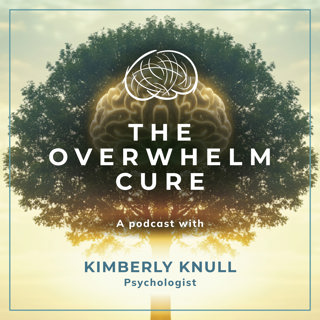
28. 20 Years of Marriage: Lessons Learned for a Thriving Relationship
In this special episode of the Overwhelm Cure Podcast, I'm sharing my reflections after 20 years of marriage. I've gained many valuable lessons and insights over the years and am excited to share them with you. You'll hear about some important topics: choosing a compatible partner, open communication, the significance of being fully committed to the relationship. You'll also hear about my experiences raising kids, managing expectations, handling conflicts, and finding ways to keep our marriage fun. Truthfully, it's challenging at times, but our relationship today is stronger than ever. I'm looking forward to the next 20 years! Timestamps: 00:00 Introduction: 20 Years of Marriage 01:11 The Beginning: How We Met 04:53 Marriage Realities: Statistics and Personal Experiences 08:31 Lessons Learned: Choosing Wisely 13:14 Commitment and Communication 22:39 Being a Best Friend and Fixing Yourself 31:23 Parenting and Planning for the Future 33:16 Seeking Help and Having Fun 37:34 Conclusion: Thriving in Marriage Links: Kimberly Knull Website Kimberly on LinkedIn Kimberly on Facebook Kimberly on Instagram
15 Heinä 38min

27: Sleep Habits for Less Overwhelm
How did you sleep last night? In today's episode, I tackle a common struggle women experience — exhaustion and quality sleep. You'll hear some of my own experiences with chasing good sleep, too. When I realized I couldn't keep chasing busyness as a status symbol, I needed to focus on getting a solid night's sleep. I used to fall asleep just fine, but then I'd wake up in the middle of the night and struggle to get back to sleep. Hormones played a role, too, so I had some sleep testing done. While productivity was once tied to my self-worth, chronic exhaustion ultimately made daily life difficult to manage. Chronic sleep deprivation has physiological and psychological effects, which can lead to sugar and processed carb cravings. Reaching for a third cup of coffee isn't going to help in the long run — or do much for our adrenaline and cortisol levels either. Listen in for some actionable advice to help you improve your sleep habits. Takeaways: Sleep is a foundational keystone habit: Prioritizing sleep makes managing stress, maintaining energy, and solving problems much easier. Consistency is key to solid sleep: Establish a consistent wake-up time and work backward to set a regular bedtime, sticking to it for several weeks to regulate your circadian rhythm. Daytime habits impact nighttime sleep: Limit caffeine intake (especially after noon/2 pm) and incorporate exercise earlier in the day. Explore underlying factors: Check with your doctor to rule out any medical issues like allergies or hormonal imbalances. Manage stress: Stress significantly impacts sleep quality; identifying and addressing stressors in your life, and even considering cognitive behavioral therapy, can greatly improve rest. Timestamps: 00:00 Introduction to Overwhelm Care Podcast 00:12 The Importance of Sleep 02:03 Personal Sleep Struggles and Solutions 03:55 Medical Interventions and Lifestyle Adjustments 06:07 Creating a Sleep-Friendly Environment 15:19 Establishing a Consistent Sleep Routine 20:33 Daytime Habits for Better Sleep 22:43 Supplements and Medical Advice 24:37 Addressing Stress and Cognitive Behavioral Therapy 26:02 Final Thoughts and Encouragement Links: Kimberly Knull's Website Schedule a free 20-minute consultation Connect on LinkedIn Connect on Facebook Connect on Instagram
7 Heinä 29min

26: My 50th Birthday Reflections: Life, Lessons, and What's Next
🎉 It's my birthday, June 28th, and I'm officially 50! Can you believe it? I was born in 1975, and now I've reached the big 5-0. When I was a kid, I thought 50 was OLD — like Golden Girls old — you know, big glasses, short permed hair, and becoming a grandma. Honestly, though, I feel nowhere close to that stage of life. I feel more like 30 or 40 years old. It's truly a privilege to be thriving, not just surviving, and cultivating a life I'm proud of. On this week's episode, I'm chatting about what 50 years have taught me — all the things my mom never told me. I'll also share some predictions for the next decade. I'm diving into some huge lessons I learned, especially after my 40s brought some unexpected challenges like hormone changes and burnout. I thought I'd be sailing smoothly, but that decade was a rollercoaster. I even "retired" at 44 because I was so burned out. While I wish I'd learned these things sooner, I'm grateful to be figuring them out now and passing them on to my kids, and to you. 4 Key Takeaways: Prioritizing personal well-being (mental and physical health, self-care, setting boundaries) becomes increasingly important, especially in midlife. Understanding and acting on your personal values and letting go of the need for external validation is key to a more fulfilling (and fun) life. Defining and pursuing your own priorities and delegating draining tasks are key to avoiding burnout. Dreaming big and continually setting new goals can lead to a life that surpasses your initial expectations. 5 Recommended Actions: Reflect on what truly brings you joy and prioritize those activities. Evaluate your current health and wellness habits, like your sleep, nutrition, and movement, then identify one small area you can improve. Identify your core values and consider how you can align your daily actions with them. Practice setting and communicating boundaries in your relationships. Allow yourself to dream big about your future, even if it feels uncomfortable. Links: Schedule a complimentary 20-minute consultation with Kimberly Connect with me on LinkedIn Timestamps: 00:00 Introduction and Turning 50 01:18 Life Expectancy Through the Ages 06:14 Lessons from My 40s 11:13 Key Life Lessons at 50 22:31 Looking Ahead to the Next Decade 27:49 Conclusion and Invitation
30 Kesä 27min

25: Design Your Dream Summer of Fun, Joy, & Connection
We just experienced the longest day of the year. In Calgary, where I live, we recently had daylight from 5:00 a.m. to 10:00 p.m. That's a lot of daylight! And overwhelm can creep in when we try to cram a year's worth of fun and joy into only two months. Summer goes by so fast. So, instead of rushing through the season, let's get super intentional to create our best summer ever. How do these intentions align with how you want to feel this summer? Think back to months ago, those cold and dreary January and February nights, when you're imagining the beautiful summer sun, dreaming of a tropical location. Well, we've got that now. So, how will you use it? In this episode of The Overwhelm Cure, we'll: Make sure YOU are at the top of your list of summer priorities while balancing your family's wishes and needs, too. Work on clarifying how you want to feel this summer with a list of all the experiences you and your family want. Review practical ways only to do what YOU want this summer, including delegating some things or taking them off your list. Discuss how to practice the discomfort of not meeting unreasonable expectations—some may even be your own. Talk about how to let go of perfection and the idea of being the "perfect" wife/mom/boss all season long. Take back some of your time and energy this summer season and give yourself the gift of a memorable and restorative summer. If you need some extra support to help create your best summer ever, get in touch. Timestamps: 00:00 Introduction and Summer Solstice 02:24 Setting Intentions for the Best Summer Ever 04:27 Creating a Manageable Summer To-Do List 06:49 Delegating Summer Tasks and Letting Go of Perfection 14:51 Summer Planning with Your Family 18:50 Opportunities to Build Meaningful Connections 21:04 Planning for Downtime and Summer Boredom 23:31 Conclusion and Invitation Other episodes you might love: 7. Plan Your Best Summer Ever: How to Create a Fun Summer Bucket List 10. The Play Prescription: Enhancing Creativity, Empathy, and Mental Wellness 8. Strong Boundaries: Your Defense Against Overwhelm
24 Kesä 24min

24: The Heart of Self-Care: Beyond the Bubble Bath
Today, we're diving deep into a topic that's important but one we sometimes misunderstand: self-care. We often think of self-care as bubble baths and massages, and while those things are lovely, they might not give us the lasting feeling we're truly looking for. In fact, I've come to realize that true self-care isn't an action but actually a question. It's about really understanding what's going on within us. When we think about self-care, do we immediately go to facials, pedicures, or a new outfit? These things sound great and can be a part of self-care, but they might only make us feel good for a few minutes. Sometimes, they even come with unwanted side effects. I remember feeling like every day was Groundhog Day when my kids were little – that monotony can be really draining. A client recently shared a similar feeling, and it reminded me how common this experience is. It got me thinking about what we would change in our lives if we could. Would we want to be less busy, stressed, tired, frustrated, or overwhelmed? I ask this question because there's a skill that can help, and it has a powerful question attached to it. That skill is mindfulness. Here's the question we need to ask ourselves: What do we really need? This is the heart of true self-care. Instead of simply noticing we don't feel awesome and numbing those feelings, we need to ask what's honestly going on. When we ask ourselves, "What is happening for me?" that's when we can get to the root of the problem and actually address it, rather than just using coping or numbing techniques. As a psychologist for almost 20 years, I've seen clients come to me with symptoms like anxiety, depression, and burnout. These are real problems that therapy addresses, and to do so effectively, we need to understand where these symptoms are coming from. Takeaways: Real self-care isn't a spa day — it's a question that addresses our internal needs. Mindfulness is about paying attention to your feelings in the moment and is a key skill that can help you identify what you truly need. Asking "What do we really need?" is the core question for effective self-care. Recommended Actions: Practice mindfulness daily by taking a few moments to check in with how you're feeling. When you experience discomfort or stress, ask yourself, "What is truly going on?" and "What do I really need?" Go beyond the symptoms of stress, anxiety, or overwhelm to get to the root cause. If you're struggling with the symptoms and feel guilty for taking time for yourself, I invite you to schedule a free 20-minute consultation. Timestamps: 00:00 What Self-Care Really Is 00:23 Rethinking Self-Care: Beyond Bubble Baths 01:52 Understanding Mindfulness 03:27 Identifying the Root Causes 14:58 The Five Dimensions of Wellness 19:50 Practical Tips for Self-Care
16 Kesä 22min

23: Rewire Your Brain with Celebrations
I've been thinking a lot about celebrations. It started with my oldest daughter's high school graduation this week. We had a blast celebrating with dinners and ceremonies, but it got me thinking about why we only focus on the big stuff. Why not celebrate the little victories, too? We often get so caught up in our daily tasks and to-do lists that we forget to acknowledge our achievements, big or small. We check things off and move on. Sometimes, we even raise the bar without taking a moment to mark our success in getting there. Skipping the small celebrations can even lead to overwhelm and burnout. We celebrate our kids and pets for all their little accomplishments, so why don't we do this for ourselves? When we celebrate, our brains release dopamine, that awesome feel-good neurotransmitter that boosts our mood and motivation. Even a little 10-second acknowledgment with a deep breath and a smile can make a difference. We need to rewire our brains to focus on the positive outcomes, not just the stress. And honestly, sometimes we resist celebrating because it feels like extra effort, right? Like planning something or even just taking the time to pat ourselves on the back might feel like more work than we have time for, but it's SO worth it! So, I'm challenging myself (and you, too!) to celebrate more, especially the seemingly small things. Celebrate waking up on time, making a great dinner, or even simply setting a boundary. Let's bring more "sparkles" or "glimmers" into our lives by celebrating more everyday moments. 5 Key Takeaways: All celebrations — even the small ones release dopamine and boost our moods, making us feel good! Acknowledging our achievements helps rewire our brains to focus on positive outcomes. Simple acts like journaling our wins, sharing accomplishments with people we love, or taking a moment for reflection can be powerful celebrations that add up over time. Shifting from focusing on what we haven't done to celebrating what we have done creates a more joy-filled life. Life gives us opportunities to learn and grow in the form of challenges, and sometimes, when we're feeling particularly challenged and we have a success, it can feel even sweeter. Small Practices to Try: Start a daily wins journal and write down at least 3 things you've accomplished each day. Share your small wins with a friend or family member to amplify the joy (which helps create more!) Treat yourself for small victories, even if it's just a relaxing bath or your favorite snack (for me, it's Hershey's Kisses) Create a small celebration ritual, like lighting a candle or playing a favorite song and dancing. Links: Connect with me on Facebook or LinkedIn Explore therapy at KimberlyKnull.com
9 Kesä 20min

22: Is Your Brain Your Friend? Taming Your Negative Self-Talk
Years ago, when my therapist first pointed this out to me, it completely changed how I understood myself. Here's what she said … "You talk to yourself all day long, pay attention to what you're saying." I have to admit that at first, I was skeptical. I was like, "I don't talk to myself all day!" But I tried it and simply noticed, and wow, was I wrong. Once I started paying attention to my inner talk, what I heard wasn't pretty. I was saying things to myself that I'd NEVER say to another person. It was harsh, critical, and honestly, kind of mean. It was shocking but also super helpful. It helped me understand why I felt and acted in certain ways, like constantly trying to prove myself. Before that, I didn't even realize this internal dialogue was happening. We often start believing those negative thoughts, and that's when we get into trouble. Our brains have a negativity bias that's designed to keep us safe. Back in the day, being kicked out of your group meant certain death. Now, our brains still act like rejection or disapproval means the end of the world. It's not true, but our brains haven't quite caught up. So, our brains are constantly scanning for things that could hurt us, emotionally or physically. This makes us more likely to focus on our mistakes, flaws, and what we fear, and can easily spin out to negativity or depression. In this episode, you'll hear some practical tips on how to challenge your negative self-talk. Here's what you'll discover today: Everyone has an internal dialogue, and it's not always nice. Pay attention to what yours is saying. Negative self-talk can greatly affect our mood and behaviour. Our brains have a negativity bias to keep us safe, but it can often backfire. You can challenge negative thoughts and replace them with helpful ones. Self-compassion is key to managing and overcoming negative self-talk. Recommended Actions: For one hour, write down your thoughts and take notice. Set an intention each day for how you want to feel. Create a list of helpful thoughts to counteract the negative ones. Practice replacing negative thoughts with positive ones throughout the day. Be kind and compassionate with yourself when you make a mistake. Links: Get in touch to book a free 20-minute consultation at https://www.kimberlyknull.com/contact
4 Kesä 22min

21: Navigating Life Transitions: How to Cope with Overwhelm
Change can kind of slap you in the face sometimes. Today, we're diving deep into something we all experience but often underestimate — life transitions and the overwhelm they can bring. You know those moments when one chapter closes, and another is only beginning? I've been feeling it strongly lately with graduations, end-of-year events, and even saying goodbye to a pet. It got me thinking about how these endings are so much more than events, but they're actually complex emotional experiences that challenge our routines, identities, and sense of self. Today's episode will help you understand why endings can be so tough on everyone. And it's not just about the life event itself but the loss of identity, the fear of the unknown, and that bittersweet nostalgia for the past. Whatever common life transition you're navigating right now — a child heading off to kindergarten or graduating high school and even career changes like retirement, you'll see how each of these stages can bring its own set of challenges and emotions. It's totally natural to feel overwhelmed by the emotions life changes can bring. Key Takeaways: Endings are complex and evoke a mix of emotions, not only sadness or relief — so it's important to feel your feelings fully. We often tie our identity to our life roles, so transitions force us to shift how we perceive ourselves. Fear of the unknown and nostalgia for the past can intensify our feelings of overwhelm during times of change. Life is a series of stages, each with unique highs and lows to navigate. Life transitions are opportunities for us to grow, cultivate resilience, and redefine who we are. Practices to Try: Acknowledge your feelings — give yourself permission to feel everything. It can be helpful to talk about your emotions with someone you trust. Seek support — lean on friends, family, or therapy (or all three) — you don't have to go through this alone. Reflect on growth — take time to recognize what you've learned and how you've grown during these transitions. Embrace new things — approach new beginnings with curiosity and an open mind — it's a chance for joy and adventure. Establish new routines — create structure in your new phase of life to combat aimlessness and feel more grounded. Get in touch: Visit KimberlyKnull.com and explore if therapy is right for you. You don't have to navigate these transitions alone. Timestamps: 00:00 Introduction: Facing Life's Changes 00:27 Personal Experiences with Endings 02:05 The Emotional Impact of Transitions 02:34 Identity and Role Changes 04:33 Coping with Overwhelm 09:21 Common Life Transitions 10:26 Parenting and Letting Go 11:53 Going from Graduation to Adulthood 13:35 Career Changes and Retirement 21:07 Coping Strategies for Transitions 26:19 Conclusion: Embracing Change
26 Touko 27min





















